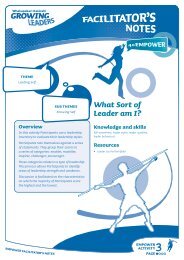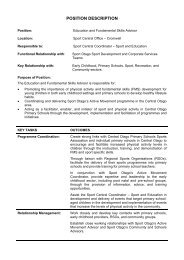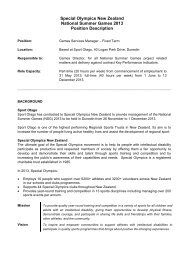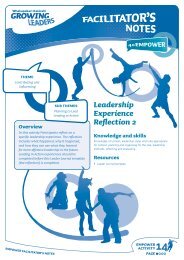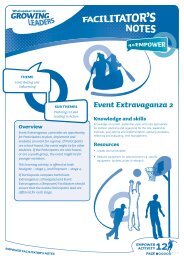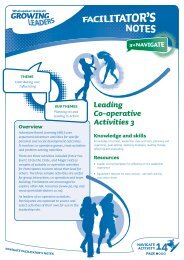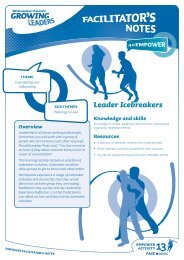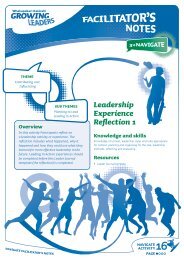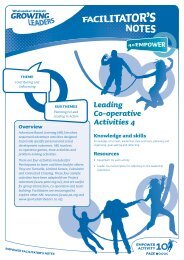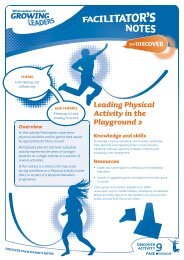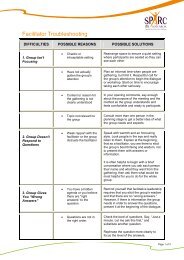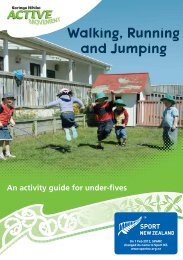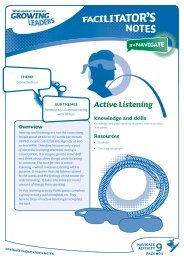Read Getting Set for an Active Nation - Sport New Zealand
Read Getting Set for an Active Nation - Sport New Zealand
Read Getting Set for an Active Nation - Sport New Zealand
Create successful ePaper yourself
Turn your PDF publications into a flip-book with our unique Google optimized e-Paper software.
“home”. Imperial links were further rein<strong>for</strong>ced by the institution of the Empire Games in<br />
1930, now known as the Commonwealth Games.<br />
<strong>New</strong> Zeal<strong>an</strong>d’s initial entry into the Olympic Games in the early decades of the twentieth<br />
century was undertaken as part of <strong>an</strong> Australasi<strong>an</strong> team. Subsequent decades have seen the<br />
country per<strong>for</strong>m in its own right with a r<strong>an</strong>ge of Olympic heroes.<br />
For Maori, marae sport <strong>an</strong>d activity was a special feature of their life in the first half of the<br />
twentieth century. Haka, poi <strong>an</strong>d action songs shared the billing with such sports as hockey,<br />
netball or tennis keenly contested at iwi gatherings that attracted thous<strong>an</strong>ds. The physical<br />
<strong>an</strong>d leisure activities became a feature in settings such as those of Waihirere <strong>an</strong>d Ngati<br />
Poneke.<br />
The impact of political <strong>an</strong>d economic <strong>for</strong>ces upon <strong>New</strong> Zeal<strong>an</strong>d society in the depression of<br />
the 1930s was also seen in their influence upon sport, such as at the <strong>an</strong>nual meeting of<br />
Auckl<strong>an</strong>d soccer in 1932 when m<strong>an</strong>y clubs were declared to be unfin<strong>an</strong>cial. A 1935<br />
advertisement <strong>for</strong> Darlow’s footballs advised potential purchasers they would be assisting the<br />
<strong>New</strong> Zeal<strong>an</strong>d farmer, t<strong>an</strong>ner <strong>an</strong>d football maker “<strong>an</strong>d thus relieving the bugbear of<br />
unemployment in your own country”. Two years later, however, a step <strong>for</strong>ward in <strong>New</strong><br />
Zeal<strong>an</strong>d sport came with the Physical Welfare <strong>an</strong>d Recreation Act 1937. The Labour<br />
Government of that time was concerned at the low level of fitness of young <strong>New</strong> Zeal<strong>an</strong>ders<br />
<strong>an</strong>d implications this had <strong>for</strong> defence. Parliamentary rhetoric revealed bipartis<strong>an</strong> beliefs in the<br />
moral <strong>an</strong>d social values of sport <strong>for</strong> the individual <strong>an</strong>d society. The Act provided <strong>for</strong> central<br />
government to gr<strong>an</strong>t sport facilities money to local governments <strong>an</strong>d allowed local<br />
government to spend money on these facilities. A physical welfare programme was hindered<br />
by the advent of World War II. A <strong>Nation</strong>al Council <strong>for</strong> <strong>Sport</strong>, set up to support sporting<br />
bodies, withered.<br />
Post-war, the country’s population became more urb<strong>an</strong> <strong>an</strong>d increasingly mobile. Perceived<br />
social problems, such as the <strong>an</strong>tisocial behaviour of teenagers with few facilities <strong>for</strong> activity,<br />
influenced consideration of the social role of sport in <strong>New</strong> Zeal<strong>an</strong>d society. Coupled with the<br />
post-war industrial growth <strong>an</strong>d result<strong>an</strong>t urb<strong>an</strong> development, the integral place of sport in<br />
<strong>New</strong> Zeal<strong>an</strong>d society was reflected in the provision of sports grounds <strong>an</strong>d facilities by local<br />
governments. In the late 1950s <strong>an</strong>d early 1960s <strong>for</strong> example, the new timber town of<br />
Kaingaroa had two dozen different org<strong>an</strong>isations associated with sport (Chapple, 1973,<br />
p.129). The daily press of each decade reveals the extent to which recreation <strong>an</strong>d sport<br />
featured in contemporary life <strong>an</strong>d indicates the gendered experience of these <strong>for</strong> much of the<br />
century.<br />
The Recreation <strong>an</strong>d <strong>Sport</strong> Act 1973, provided <strong>for</strong> the establishment of a Council <strong>for</strong> Recreation<br />
<strong>an</strong>d <strong>Sport</strong> <strong>an</strong>d created the Office of a Minister of Recreation <strong>an</strong>d <strong>Sport</strong>. Administratively, the<br />
political recognition of sport – at times in a response to perceived social needs – was further<br />
reflected in the rise of the <strong>New</strong> Zeal<strong>an</strong>d <strong>Sport</strong>s Foundation <strong>an</strong>d the Hillary Commission.<br />
Arguably, these structures have assumed de facto roles of social org<strong>an</strong>isation <strong>an</strong>d control of<br />
recreation <strong>an</strong>d sport through their powers of fin<strong>an</strong>cial disbursement <strong>an</strong>d economic patronage.<br />
In the past three decades the main administrative ch<strong>an</strong>ges, <strong>an</strong>d reviews of recreation <strong>an</strong>d<br />
sport have included:<br />
Ministerial Task<strong>for</strong>ce on <strong>Sport</strong>, Fitness & Leisure J<strong>an</strong>uary 2001 page 20 of 153



